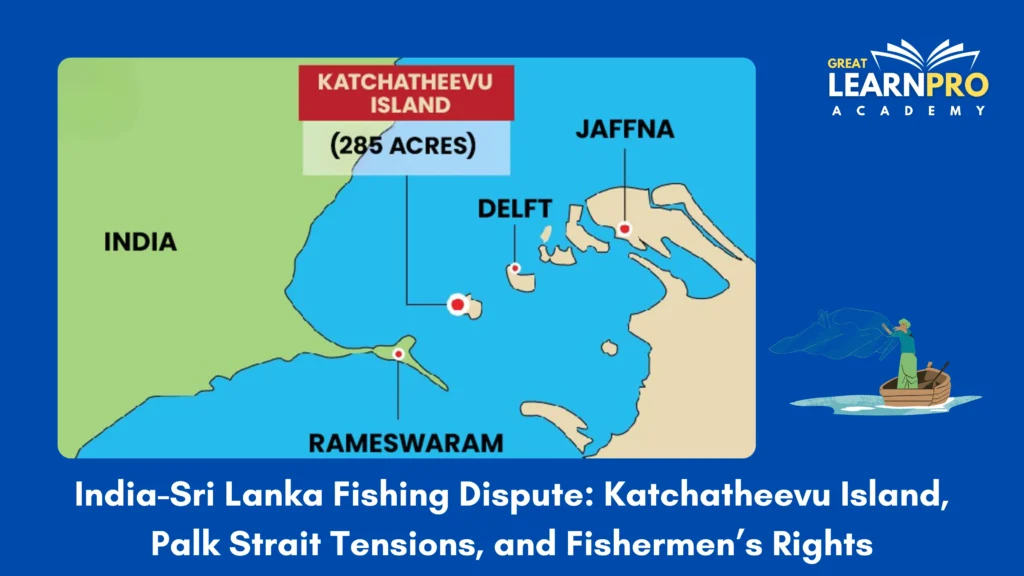The India-Sri Lanka fishing dispute remains one of the most pressing and persistent bilateral issues between the two nations, deeply tied to geography, history, and livelihood concerns. At the heart of this dispute lie the Katchatheevu Island and the Palk Strait/Palk Bay, which have become flashpoints for recurring tensions involving fishermen, governments, and navies.

Historical Context
The dispute is rooted in the 1974 Indo-Sri Lankan Maritime Agreement, under which India recognized Katchatheevu, a small uninhabited island, as Sri Lankan territory. The treaty was followed by a 1976 exchange of letters, where India renounced fishing rights for its citizens in these waters, while retaining limited access for pilgrimage purposes. Tamil Nadu fishermen, however, have historically used the Palk Bay as their traditional fishing ground, and the sudden denial of access disrupted livelihoods.
Geographical Significance
The Palk Strait is a narrow stretch of water separating Tamil Nadu in India from the Jaffna region in Sri Lanka. The area is rich in marine biodiversity, making it a fertile fishing ground. But its narrowness less than 30 km at certain points leads to frequent accidental or deliberate crossings of the International Maritime Boundary Line (IMBL). This fuels recurring tensions as fishermen from Tamil Nadu cross into Sri Lankan waters in pursuit of catch.
Key Issues
- Katchatheevu Island: While ceded to Sri Lanka, its symbolic and practical significance remains high in Tamil Nadu politics. Local fishermen demand restoration of fishing rights, claiming that traditional access has been unfairly curtailed.
- Arrests and Detentions: The Sri Lankan Navy often detains Indian fishermen who enter their waters, confiscating boats and equipment. This creates humanitarian issues, as families lose breadwinners and boats worth lakhs are destroyed or impounded.
- Ecological Concerns: Indian fishermen, particularly from Tamil Nadu, often use bottom trawling, a destructive method that damages marine ecosystems and depletes fish stocks. Sri Lankan authorities view this as harmful to their resources, especially since many northern Sri Lankan fishermen, recovering from the civil war, depend on sustainable fishing.
- Political Sensitivity: Tamil Nadu parties have consistently raised the Katchatheevu issue in Parliament, framing it as a matter of sovereignty and fishermen’s rights. Successive Indian governments, however, have refrained from reopening the treaty due to concerns over bilateral relations and international law obligations.
Insights from The Hindu Editorials
Editorials in The Hindu have stressed that the solution lies not in territorial renegotiation, but in sustainable, humane, and cooperative management of fisheries:
- Dialogue Among Fishermen: Platforms where Indian and Sri Lankan fishermen can directly communicate could ease tensions and foster localized agreements.
- Alternative Livelihoods: India must support Tamil Nadu fishermen in shifting from bottom trawling to deep-sea fishing or alternative practices, reducing dependency on contested waters.
- Humanitarian Approach: Arrested fishermen should be treated fairly, with mechanisms for quick release and return of boats, minimizing economic devastation.
- Environmental Sustainability: Both countries must jointly address ecological concerns by regulating harmful fishing methods and protecting marine habitats.
- Diplomatic Cooperation: Instead of populist rhetoric, both governments should strengthen existing institutional frameworks like the Joint Working Group on Fisheries.
The Way Forward
A long-term resolution requires balancing legal sovereignty, ecological sustainability, and human livelihoods. This may include:
- Phasing out bottom trawling with government subsidies and alternatives.
- Establishing shared fishing zones or seasonal access windows under bilateral agreements.
- Expanding deep-sea fishing schemes to reduce dependency on shallow contested waters.
- Regularizing humanitarian mechanisms for fishermen caught in disputes.
- Promoting joint marine research and conservation in the Palk Bay.
Conclusion
The India-Sri Lanka fishing dispute is not just about maritime boundaries; it is about people, survival, and ecological preservation. The Katchatheevu and Palk Bay issues highlight how overlapping histories, treaties, and environmental pressures collide in a narrow stretch of water. The Hindu rightly underlines that any sustainable resolution must prioritize both fishermen’s welfare and environmental conservation, while respecting established treaties. Diplomacy, cooperation, and compassion must replace confrontation, ensuring peace in the Palk Strait for generations to come.
Sources:
- The Hindu, “Sharing resources: on fishermen and the Palk Bay dispute” (Editorial) – https://www.thehindu.com/opinion/editorial/sharing-resources-on-fishermen-and-the-palk-bay-dispute/article67694642.ece
- The Hindu, “Resolving the vexatious fishing dispute” (Editorial, March 13, 2025) – https://www.thehindu.com/opinion/editorial/resolving-the-vexatious-fishing-dispute/article68029591.ece
- ICSF (International Collective in Support of Fishworkers), reprint of The Hindu editorial – https://icsf.net/newss/sharing-resources-on-fishermen-and-the-palk-bay-dispute-editorial-fromthe-hindu/
- https://www.indiatoday.in/india/story/katchatheevu-island-tamil-nadu-fishermen-sri-lanka-indira-gandhi-palk-strait-fishing-s-jaishankar-dmk-2521854-2024-04-02?utm_
- https://frontline.thehindu.com/world-affairs/tamil-fishermen-sri-lanka-navy-india-sri-lanka-relations-katchatheevu-palk-bay-trawling/article68796199.ece?utm_
More Current affairs: https://learnproacademy.in/updates/
